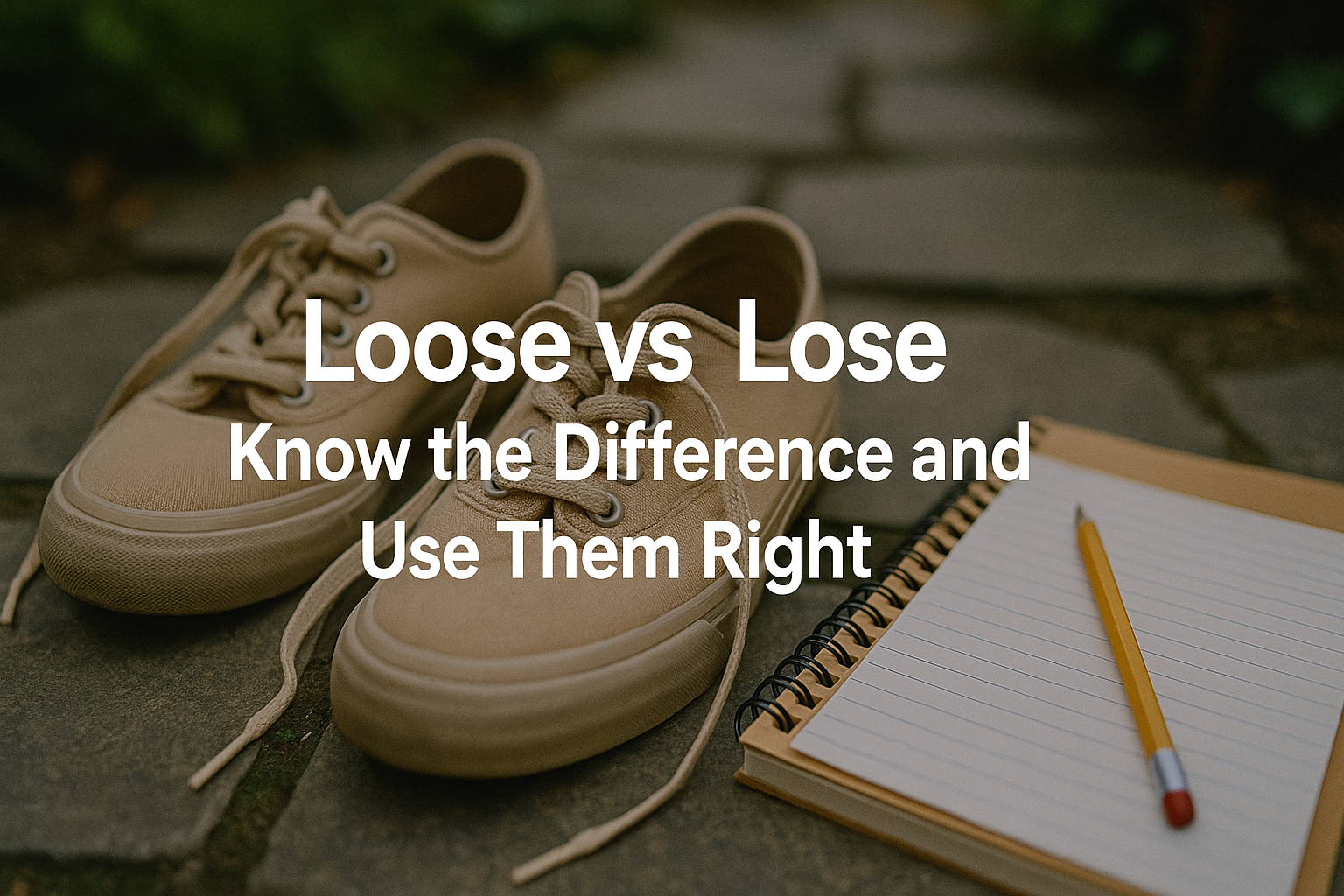When people mix up loose vs lose, small mistakes can make a big difference. You might write one word when you mean the other—and change your meaning entirely. Get it right by digging into the definitions, context, pronunciation, grammar rules, and usage tips below.
What Do Loose and Lose Actually Mean?
Loose – Definition & Usage
Loose usually describes something not tight or securely fastened—like a loose screw or loose clothing. You can also use it as a verb (rarely) to mean “to release” or “set free,” as in he loosed the bird.
Lose – Definition & Usage
Lose works only as a verb. It means failing to keep or retain something, such as lose your keys, lose a game, or lose control. You’ll never see it used as an adjective or adverb.
Read More About This Article: Thoraxes or Thoraces? Understanding the Correct Plural of “Thorax” in English and Science
Grammar Function & Part of Speech
| Word | Part of Speech | Example |
|---|---|---|
| Loose | Adjective | The bolt is loose. |
| Loose | Verb (rare) | She loosed the bird. |
| Lose | Verb | Don’t lose your wallet again. |
- Loose can act as an adjective and occasionally a verb.
- Lose remains strictly a verb.
Understanding this clear distinction nails down correct usage every time.
Meaning & Usage in Everyday Context
Loose in Common Situations
- Loose clothing: Baggy jackets or shirts that don’t fit snugly
- Loose screw or bolt: A part not properly tightened
- Loose ends: Unresolved tasks or forgotten details
Lose in Real-Life Situations
- Lose your phone: Misplacing your device
- Lose a competition: Getting defeated
- Lose control: Letting things get out of hand
💡 Mixing these words often happens when people type too quickly or rely solely on sound.
Pronunciation & Mnemonics
- Lose: Pronounced /luːz/ (rhymes with choose)
- Loose: Pronounced /luːs/ (rhymes with goose)
🎯 Mnemonic tip: Loose has the extra “O”—so it’s Looser, loOser, free, and open. That memory trick helps reinforce correct spelling.
Common Mistakes to Watch For
- ❌ “Don’t loose that key!”
✅ “Don’t lose that key!” - ❌ “Your pants are lose.”
✅ “Your pants are loose.”
Social media posts and casual emails often show these flubs. Spot them, correct them, and your writing will instantly appear sharper.
Synonyms & Alternatives
For Loose
- Slack
- Baggy
- Unsecured
- Free
- Detached
For Lose
- Misplace
- Forfeit
- Fail
- Shed
- Be defeated
Sprinkling synonyms adds variety and builds awareness of each word’s nuance.
Origins & Etymology – Where These Words Came From
- Loose traces back to Old Norse lauss and Old English leas, meaning “free” or “not bound.”
- Lose comes from Old English losian (“to perish” or “become lost”) and relates to Proto‑Germanic lausa‑.
Both stem from the Proto‑Indo‑European root leu‑, meaning “to loosen or separate.” Over time, loose turned into an adjective, while lose kept its sense of deprivation or loss.
Idioms & Phrases Featuring Loose or Lose
| Phrase | Meaning |
|---|---|
| Loose cannon | Unpredictable, dangerous individual |
| At loose ends | Feeling aimless or unfinished |
| Lose your cool | Become very angry |
| Loose change | Small coins or leftover bits |
| Lose track of time | Become unaware of time passing |
| Cut loose | Break free or act without restraint |
Idioms help cement the proper usage of each word in your memory.
Real Examples from Media & Literature
- Loose: “The bolt had grown too loose, causing the door to scrape.” — The New York Times
- Lose: “You mustn’t lose hope, even when things seem bleak.” — BBC News
These examples reinforce real-world use in high-quality writing.
Writer’s & Learner’s Tips
- Double-check your writing. Ask: “Am I spelling tough or loose?”
- Substitute test: If you’d use “tight,” choose loose. If “win” fits better, use lose.
- Fill-in-the-blanks exercises help reinforce memory: “Don’t ____ your wallet.”
- Spot-check with Grammarly or word processing tools to flag misuse.
Using this checklist ensures consistency and keeps your writing clean.
Quick Reference Table
| Feature | Loose | Lose |
|---|---|---|
| Spelling | Double “O” | Single “O” |
| Pronunciation | /luːs/ (rhymes with goose) | /luːz/ (rhymes with choose) |
| Part of Speech | Adjective, rare verb | Verb only |
| Core Meaning | Not tight or unbound | Fail to keep or win |
| Mnemonic | Extra “O” = freer/open | Rhymes with choose |
✍️ Writer’s Quiz – Test What You Know
Choose the right word to complete each sentence:
- Don’t ______ your phone during the trip.
- That bolt feels ______ and may fall off.
- If you ______ the match, you might feel disappointed.
- She ______ the arrow carefully into the quiver.
Answer key: (1) lose, (2) loose, (3) lose, (4) loosed (rare verb)
Final Thoughts: Mastering Loose vs Lose
Once you understand the meaning differences, grammar roles, and context, it’s harder to mix up loose vs lose.
The loose adjective paints images of slack clothing, gaps, or freedom, while the lose verb tells stories of loss, forgetting, or failure.

